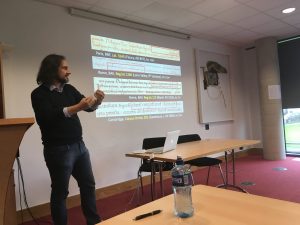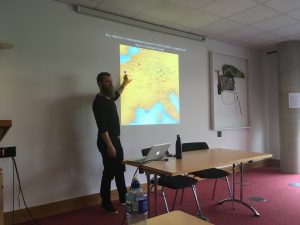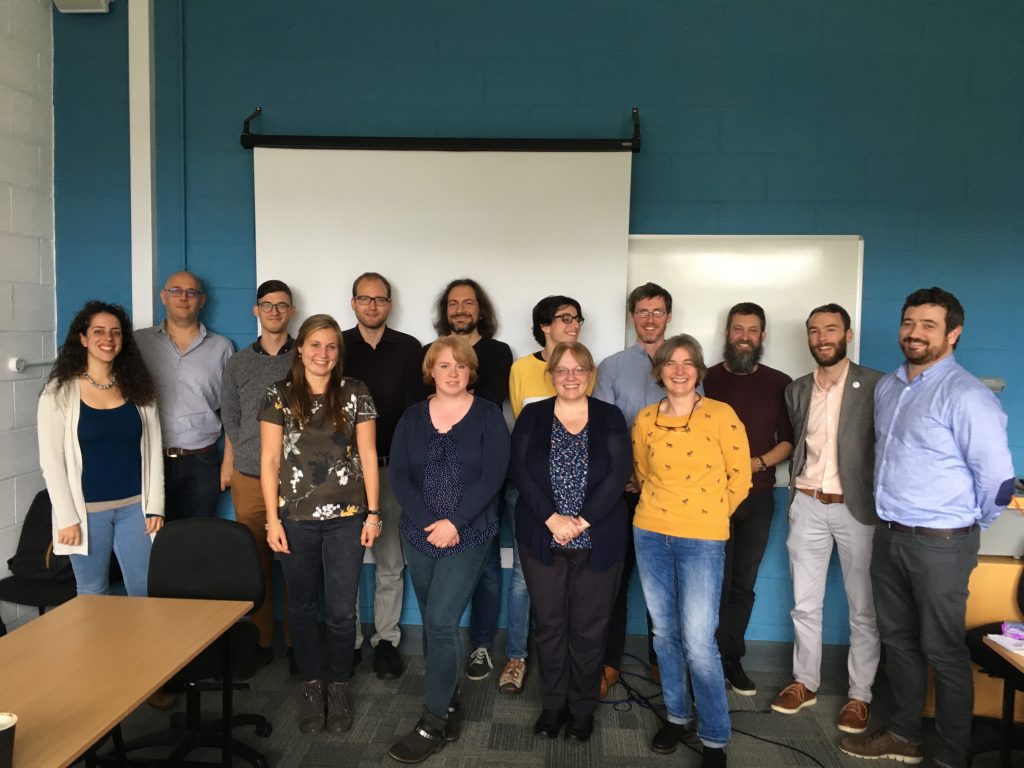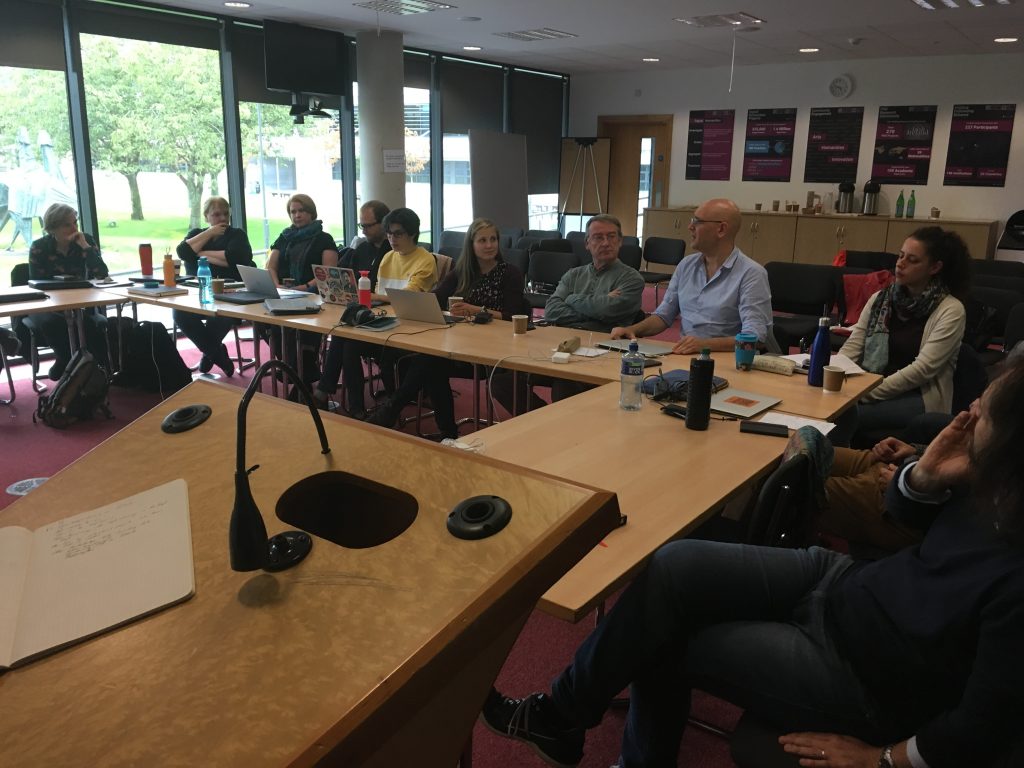Adventures in Zero G: Knowledge Exchange in Early Medieval Digital Humanities
My current understanding of digital humanities is that it is something like the International Space Station (ISS): ISS constitutes an entirely new environment in which research takes place, and I think the digital medium can potentially be understood as something analogous. On the one hand, ISS is used for experiments on growing plants in space, which you might compare to digital textual analysis—that is, you bring something existing into the new environment and see what you can learn. On the other, ISS is also the subject of study in and of itself, as are digital media and all of their component aspect. What’s more, ISS also offers a different perspective on the Earth and the universe that surrounds it, analogous to the seemingly infinite expanse of digital advancement and potential. This diverse set of considerations, which, in addition to the areas of expertise that they span, make digital humanities a challenging area of scholarship to enter, survey and navigate.
This multiplicity of perspectives is also part of the reason that digital humanities is a field in flux. A series run in The Chronicle of Higher Education earlier this year aptly illustrates this: entitled ‘The Digital Humanities Wars’, it featured articles by Professor Nan Z. Da (University of Notre Dame) and Professor Ted Underwood (University of Illinois at Urbana-Champaign). Both focus on the merits of quantitative methods in humanities research, Professor Da arguing that the results are ‘either banal or … not statistically robust’ and Professor Underwood defending the work on the basis that ‘human self-understanding is a collaborative project,’ of which the digital humanities is an integral part.

The fact is that the digital aspects of humanities research are incredibly varied in form and function. Digital resources, tools and methods are fundamental to recording, analysing and sharing knowledge, but the best uses of them are far from agreed upon, even within specific fields. As a result, even when discussing tasks within particular projects, bigger questions continuously present themselves, and this was certainly the case within the series of Early Medieval Digital Humanities (EMDH) workshops.


The EMDH project consisted of four workshops—two held in Trinity College Dublin and two in the Moore Institute here in NUIG—and arose from the establishment of two research projects and a call for specific stream of Irish Research Council funding. The projects in question are Dr Jacopo Bisagni’s Ireland and Carolingian Brittany: Texts and Transmission (IrCaBriTT), based in Classics in NUI Galway, and Dr Immo Warntjes’s The Irish Foundations of Carolingian Europe: The Case of Calendrical Science (IFCE), based in History at Trinity College Dublin—both funded by the IRC Laureate Award scheme. Although different in their subject matter and approach, both projects engage with the transmission of early medieval scholarly texts and the manuscripts in which they are preserved, and both make use of a range of digital tools and methods.
 This is where the IRC New Foundations call came in, which includes a stream dedicated to ‘Knowledge Exchange for Impact’ that facilitates collaboration between scholars at various career stages in order to maximise the impact of their individual expertise and experience. A proposal was put together to this end, comprising four days of training, presentations, and discussion. Not only was the proposal successful, but we were further able to capitalise on the opportunity to expand the event thanks to additional funding from the Moore Institute and the NUI Galway Research Office.
This is where the IRC New Foundations call came in, which includes a stream dedicated to ‘Knowledge Exchange for Impact’ that facilitates collaboration between scholars at various career stages in order to maximise the impact of their individual expertise and experience. A proposal was put together to this end, comprising four days of training, presentations, and discussion. Not only was the proposal successful, but we were further able to capitalise on the opportunity to expand the event thanks to additional funding from the Moore Institute and the NUI Galway Research Office.
Many of the workshops focussed on technical elements essential to the IrCaBriTT and IFCE projects—Dr Warntjes provided a guide to computus (medieval time-reckoning), Dr Stefan Hagel led us through the functionalities of his Classical Text Editor software, Dr Justin Tonra introduced us to TEI XML, and Mr David Kelly covered digital project design and development and Edition Visualisation Technology software. The final workshop facilitated a broader discussion of participants’ experiences of digital projects, including successes, lessons learned, obstacles overcome and future plans.

From the wealth of contributions made by participants regarding the application of digital resources and methods to research on medieval texts a number of prominent themes emerged, many relating to the ongoing and global conversations around standardisation, interoperability, and long-term preservation and maintenance. For my part, the biggest realisation was just how deeply seductive the potential applications of digital resources and approaches are. While I remain awed and inspired by all that could be done in relation to early medieval texts and their manuscripts, these workshops demonstrated the importance of pragmatically assessing and prioritising productive and useful ways to engage with a given source and set of research questions. This includes the challenge of striking a balance between the potential and future use of the research and the more immediate goals and limited resources of the project in progress. In this regard, developing and following best-practice approaches seems the most effective way to ensure that work accomplished now can continue to contribute to the development of humanities research later.
The key to all of these issues seems to be communication. As I determinedly focus on a single early medieval text and the puzzles it presents—‘growing plants in space’, as it were—every conversation I have participated in under the banner of digital humanities has involved people from different backgrounds collectively responding to a set of common questions, and each such conversation has offered an additional insight into the digital universe as a whole.

This post is inextricably rooted the workshop discussions, and I would like to take the opportunity to thank the participants again for their generous contribution of expertise and insight:
- Jacopo Bisagni (IrCaBriTT, Classics, NUI Galway),
- Francesca Guido (Classics, NUI Galway),
- Stefan Hagel (Classical Text Editor, Austrian Academy of Sciences),
- Paula Harrison (IrCaBriTT, Classics, NUI Galway),
- Anthony Harvey (Dictionary of Medieval Latin from Celtic Sources, Royal Irish Academy),
- Judith ter Horst (IFCE, History TCD),
- Ann Hurley (Classics, NUI Galway),
- David Kelly (Digital Humanities Manager, Moore Institute, NUI Galway),
- Joseph Kelly (Dictionary of Medieval Latin from Celtic Sources, Royal Irish Academy),
- Tobit Loevenich (IFCE, History TCD),
- Pádraic Moran (Classics, NUI Galway),
- Dáibhí Ó Cróinín (History, NUI Galway),
- Jean Paul Rehr (de Heresi, Université Lumiere Lyon 2, CIHAM),
- Christian Schweizer (IFCE, History TCD),
- Evina Steinová (Innovating Knowledge, Huygens ING),
- Thom Snijders (computus.lat),
- Mariken Teeuwen (Huygens ING),
- Justin Tonra (English, NUI Galway),
- Immo Warntjes (IFCE, History TCD).
Sarah Corrigan
Dr Sarah Corrigan is a postdoctoral researcher on Dr Jacopo Bisagni's Ireland and Carolingian Brittany: Texts and Transmission IRC Laureate project, working on biblical exegesis in early medieval Brittany.

